There is nothing quite like the sense of tranquillity and intrigue that comes with visiting a museum space. Whether we’re getting up close and personal with artefacts from momentous historical events or admiring the brushstrokes of Renaissance art, museums are a place for all ages and walks of life to become immersed in human history.
Visiting a museum doesn’t need to be an activity reserved for a holiday or rainy day, either. Many museums and galleries have extensive exhibition programmes alongside their permanent ones, meaning you can find the perfect exhibition to top up your cultural cup, from your favourite period of history to budding artists who are making a name for themselves.
If you find yourself on the hunt for an iconic museum to tick off your bucket list or want to try something different and explore a new city or area that houses some hidden gems, we’ve got the list for you.
32 museums you should visit in your lifetime
Smithsonian National Museum of Natural History, Washington, D.C, USA

(Image credit: Alamy)
Part of the Smithsonian Institution, the Smithsonian National Museum of Natural History showcases over 145 million specimens including the Hope Diamond and complete dinosaur skeletons and is situated on a site larger than 18 football pitches!
Located in America’s capital city of Washington D.C, this museum is one of the most visited natural history museums in the world and hosts a jaw-dropping array of art, historical pieces and research on science and the natural world. Even better, entry is free.
The Albertina Modern Museum, Vienna, Austria
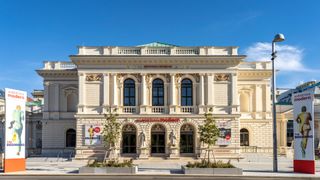
(Image credit: Alamy)
Located in the beautiful city of Vienna, the Albertina Modern Museum is home to over 60,000 works of modern art and is set in the beautiful Künstlerhaus exhibition hall in central Vienna. The younger sibling of the world-famous Albertina Museum, this museum is dedicated to the exploration and presentation of modern, postmodern and contemporary art from across the world. Home to works by artists such as Dieter Roth and Gilbert & George, it is a fun way to view contemporary pieces of art in the city.
The Louvre, Paris, France
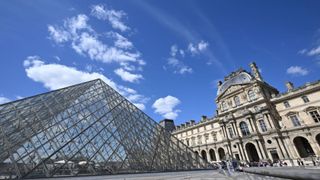
(Image credit: Getty Images)
What list of iconic and impressive museums would be complete without the largest and most visited museum in the world, the Louvre? Housing over 35,000 works of art, including the famous ‘Mona Lisa’ and ‘Venus de Milo’, The Louvre has some of the richest collections of art dating back to 7000 BCE, to pieces capturing France’s tumultuous revolution in 1789. Located in the centre of Paris, The Louvre is a must-see for anyone visiting Paris and is easily reached via the Metro or on foot whilst taking in the romantic scenery of the Seine. While tickets may be a bit pricey, it is worth it for the expansive collection of art and sculpture.
Tokyo National Museum, Tokyo, Japan
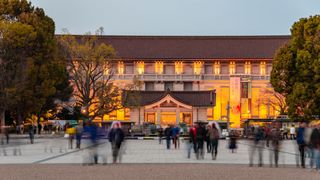
(Image credit: Alamy)
The Tokyo National Museum is Japan’s oldest national museum and offers a comprehensive collection of Asian art, including samurai swords, ancient pottery, and Buddhist sculptures. The first exhibition was held in 1872 and has since moved and changed to reflect different eras and administrations within Japanese culture. The museum presents around 3,000 artefacts at any one time and is subject to change every four to eight weeks, meaning visitors will often see a truly unique display of valuable artefacts and national treasures. Set on the grounds of the luscious Ueno Park, this museum is wonderful both inside and out.
National Museum of Scotland, Edinburgh, Scotland
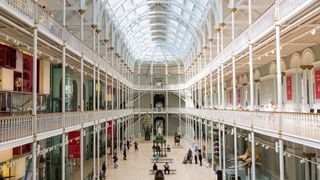
(Image credit: Alamy)
Combining both Scottish and world history, the National Museum of Scotland aims to make worldwide history accessible for all. With over 820,000 items in its collection, visitors to this museum can expect to see anything from Viking artefacts to Renaissance art and pieces of Scottish history relating to influential people like Mary Queen of Scots and Scotland’s role in major historical events like the Cold War. Located near the Edinburgh Old Town, you will be surrounded by exciting history everywhere you look!
Apartheid Museum, Johannesburg, South Africa
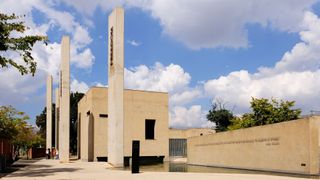
(Image credit: Alamy)
An institution at the heart of preserving South Africa’s complex and troubled past, the Apartheid Museum in Johannesburg is a must-visit. The extensive artefacts relating to the rise and fall of the Apartheid that gripped the country for much of the 20th century and beyond have been curated by a range of filmmakers, designers and historians, all to display this complex period in South African history. Permanent exhibitions cover everything from the beginnings of Apartheid to the liberation movement and the historic efforts of Nelson Mandela, the African National Congress party and South Africa’s revised, progressive constitution.
The Metropolitan Museum of Art, New York City, USA
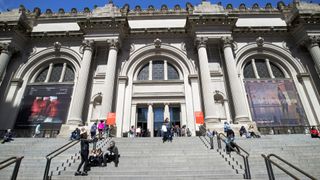
(Image credit: Alamy)
Known as ‘The Met’, The Metropolitan Museum of Art museum houses works of art spanning 5,000 years of world history, from ancient Egypt to modern art by the likes of Henri Matisse and Vasily Kandinsky. While the museum was founded in 1870, the roots date back further to Paris in 1866, when a group of Americans decided to create a national collection of art that would allow everyday Americans to access art and learn. It’s now visited by more than 5 million every year. The Met is also home to the annual Met Gala, which sees hundreds of celebrities raising money for the museum’s costume institute by dressing in glamorous and artistic outfits for a certain theme and impressing the event’s co-chair and Editor-In-Chief of Vogue, Anna Wintour.
Mexico Museo Nacional de Antropología, Mexico City, Mexico
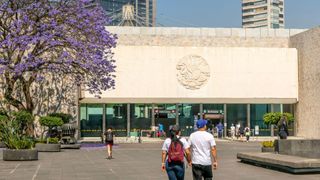
(Image credit: Alamy)
This museum, located in the capital of Mexico, is dedicated to the pre-Columbian heritage of Mexico. Featuring the iconic Aztec Sun Stone and artefacts from the Mayan, Olmec, and other indigenous civilizations, the Museo Nacional de Antropología is Mexico’s largest museum and home to its most extensive collection of archaeological and ethnographic artefacts.
The building’s impressive architecture is home to 22 rooms filled with wonderful sculptures, bowls and religious iconography. The museum often runs additional exhibitions as well, so you can be sure it will be brimming with exciting rare artefacts and untold histories to learn about one of the oldest civilisations in the world.
The Acropolis Museum, Athens, Greece
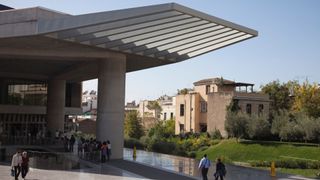
(Image credit: Alamy)
Situated near the historic Acropolis in Athens, Greece, the Acropolis Museum displays a vast collection of ancient Greek art and artefacts all found on the site of the Acropolis. From sculptures from the Parthenon to busts of Greek gods and goddesses, the museum itself opened in 2009 and features over 4,200 objects for its visitors to see and learn about.
The museum is also still extremely active in its research and preservation of these precious Ancient artefacts and is a hive of activity and innovation to understand more about Greek history that took place only a few feet from where the museum stands today.
Museum of Qin Terracotta Warriors and Horses, Xi’an, China
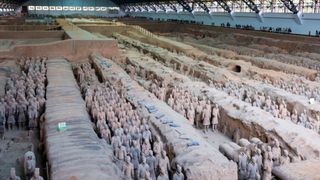
(Image credit: Alamy)
Nothing will prepare you for the otherworldly site that is rows and rows of perfectly preserved ancient Terracotta warriors, who stand proudly protecting Emperor Qin Shi Huang for his journey to the afterlife. Some of these artefacts were discovered by peasants in 1974 and soon worldwide attention and excitement put these incredible figures as one of the most significant archaeological excavations in the 20th century.
There are over 7,000 pottery chariots, soldiers and horses at the museum which was recognised in 1987 as a UNESCO World Heritage site.
Musée de l’Orangerie, Paris, France
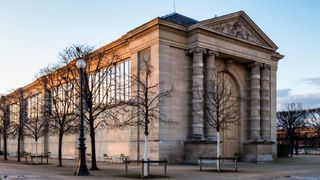
(Image credit: Alamy)
Originally designed to house orange trees that decorated the Tuileries Palace during the Winter, the Musée de l’Orangerie is known for its collection of Impressionist and Post-Impressionist paintings. Perhaps it is most famous for Monet’s “Water Lilies” series, which is displayed in two stunning oval rooms. But there are plenty of other incredible works for visitors to see at the Musée de l’Orangerie, including Paul Cezanne, Marie Laurencin and Amedeo Modigliani. Located close to the Seine river and a short stroll away from the Louvre, this museum will give you a rich and exciting day out in the French capital.
The Museu de Arte de São Paulo, São Paulo, Brazil

(Image credit: Alamy)
The Museu de Arte de São Paulo is Brazil’s first modern museum that was founded in 1947 by Brazilian businessman Assis Chateaubriand. Consisting of more than 11,000 works from across the world, it has become one of South America’s most important collections of art and objects. Works by Renoir and Picasso are sat alongside works by famed Brazilian artists such as Maria Auxiliadora and José Antônio da Silva and offer visitors a different perspective on art and Brazilian culture. Additional exhibitions throughout the year make this museum in São Paulo a must-see in your lifetime!
The British Museum, London, England
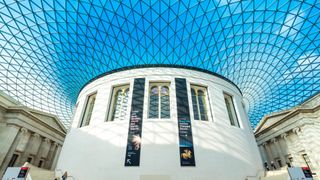
(Image credit: Alamy)
Founded in 1753, The British Museum is considered to be the first national museum to house artefacts from all areas of human knowledge and exploration, from art to science and history. With a collection of more than 8 million artefacts from around the world (roughly 80,000 are on show to the public at any one time) including the Rosetta Stone and the Elgin Marbles, it truly is a treasure trove of human history, art, and culture. While the museum has not been without its scandals of ownership and misplaced items, it is a wonderful museum in the heart of London that will delight people of all ages.
Museum of Black Civilizations, Dakar, Senegal
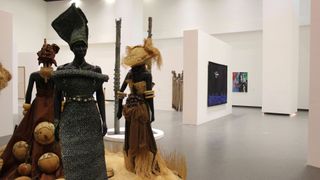
(Image credit: Alamy)
A relatively new museum that opened in 2018, the Museum of Black Civilisations in the Senegalese capital of Dakar showcases the rich history of Africa’s contribution to culture and science. The project was a labour of love envisioned by Senegal’s first President, Leopold Sedar Senghor, who was keen to create a museum that represented the culture of Black people across the entire country and wider continent. Collections of artefacts include armour, sculptures and countless art pieces that have been reclaimed from the colonial era. It is sure to only grow in its number of artefacts and rich history that more people can now access and enjoy.
The National Palace Museum, Taipei, Taiwan

(Image credit: Alamy)
Located in Taipei, the capital city of Taiwan, the National Palace Museum houses a vast collection of Chinese imperial artefacts and artworks, including ceramics, jade, and ancient scrolls from Taiwan’s vast history and ever-present connection to China. Many of the artefacts within the museum correspond to the different ruling dynasties within the country, including the famous Ming dynasty. Expect stunning watercolour and calligraphy pieces and priceless ceramics and vases in this stunning building set over four floors.
The Museum of Alhambra, Granada, Spain

(Image credit: Alamy)
More than a museum, The Museum of Alhambra is a historic palace and fortress complex. Its stunning Islamic architecture and art make it one of Spain’s most significant cultural landmarks and home to the biggest collection of Nasrid art in the world. The Alhambra was home to the royalty and court of Granada in the thirteenth century, and the site of the museum has been historically used to house artefacts collected by the Provincial Commission of Monuments. Permanent exhibitions at the Museum of Alhambra include works on faith, science and Nasrid art. The wider area of Alhambra sits on a rocky outcrop on the banks of the River Darro, and its truly a breath-taking site for all of its visitors.
Vatican Museum, Vatican City, Italy
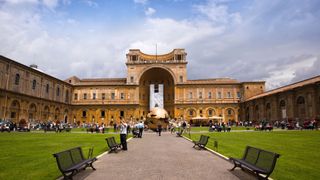
(Image credit: Alamy)
The Vatican Museum is perhaps one of the most famous and recognisable museums in Europe, containing an impressive collection of art amassed by the Roman Catholic Church over many centuries. Some of the breathtaking works on display include Michelangelo’s Sistine Chapel fresco and numerous sculptures and the ancient Laocoön statue, depicting Laocoön warning the city of Troy about the incoming attack on its citizens. Elsewhere within Vatican City, you will be nothing short of overwhelmed with the amount of history and stunning buildings, so be sure to leave yourself plenty of time to take in the outside of the museums as well as the inside.
Rijksmuseum, Amsterdam, Netherlands
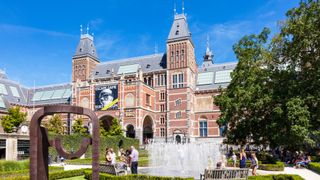
(Image credit: Alamy)
The national museum of the Netherlands, The Rijksmuseum is the Netherlands’ most famous museum and home to an extensive collection of Dutch Golden Age paintings, including works by Rembrandt and Johannes Vermeer. The museum is rich in 800 years of Dutch history from 1200, the colonial era and through to the modern day. Located a short walk away from both the famous Vondelpark and Van Gogh Museum, visiting the Rijksmuseum is a perfect way to immerse yourself in Dutch culture and spend a day in Amsterdam.
The Getty Center, Los Angeles, USA

(Image credit: Alamy)
Known for its impressive architecture, gardens and astounding views of Los Angeles, the Getty Center houses an extensive collection of European paintings, sculptures, and decorative arts. It is one of the largest worldwide collections of cultural institutions dedicated to art and strives to preserve the rich history of human connection to visual art. From Van Gogh’s ‘Irises’ and some of the earliest modern-day microscopes to 1300 BCE busts, the Getty Center is an iconic museum that will give you a wide-ranging perspective on civilisations and their connection to creativity.
Museum of New Zealand, Wellington, New Zealand
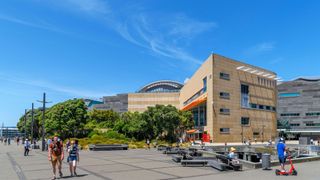
(Image credit: Alamy)
New Zealand’s national museum, known as the Museum of New Zealand, houses much of the country’s rich culture and deep indigenous roots. Before the museum became the institution it is today, it had previously focused on scientific endeavours in the late 1800s before becoming the National Gallery that also focused on visual art as well. By the 1930s, a dedicated art space was opened and the gallery became the National Museum and has since been focused on gathering objects and histories to represent its Māori heritage and diverse community. Today, you can see everything from tribal leader photographs to historical documents. It is sure to be a memorable experience for anyone who goes there!
The National Gallery, London, England
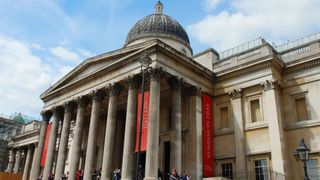
(Image credit: Alamy)
The National Gallery in London houses over 2,300 paintings, including masterpieces by J.M.W Turner and Gainsborough, making it one of the most significant collections of European art. The National Gallery is also one of the few art museums in the world with an on-site artists studio, making it available for residencies of artists to grow their work and style surrounded by this impressive collection of Western art.
The Palace Museum, Beijing, China
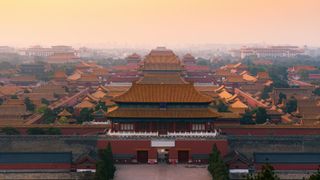
(Image credit: Alamy)
Located in the ‘Forbidden City’ in Beijing, The Palace Museum is home to a vast collection of Chinese art and historical artefacts, showcasing the deep history of Chinese imperial life. Spanning the many dynasties within China’s history, visitors can expect to see a range of ceramics, textiles (such as armour and traditional clothing) and ancient carvings that will be truly memorable and breath-taking to look at, as well as marvel at the stunning architecture of the Palace itself that is sat on 180 acres of land. Be sure to take plenty of pictures of the stunning objects and surroundings of one of the biggest museums in the world!
Uffizi Gallery, Florence, Italy
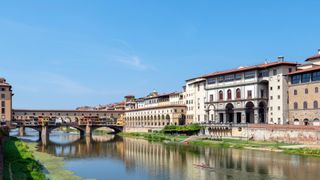
(Image credit: Alamy)
Known as the art capital of Italy, Florence is one of the most famous locations for seeing breathtaking art. Boasting an unparalleled collection of Renaissance art, expect to see iconic works including masterpieces like Botticelli’s ‘The Birth of Venus’, Michelangelo’s ‘Primavera’, and Leonardo da Vinci’s ‘Annunciation’ (among thousands of others). Located along the Arno River, it comprises the Uffizi itself, Pitti Palace and the Boboli Gardens which are connected by the Vasari Corridor, giving its visitors a chance to while away the day in the area. Also nearby is the famous Ponte Vecchio bridge where there are countless local jewellery artisans and souvenir shops to explore.
Museum of Modern Art, New York City, USA

(Image credit: Alamy)
The Museum of Modern Art (or ‘MoMA’, as it is affectionately called) is one of the most influential modern art museums in the world. Located in New York City, MoMA is home to some 200,000 pieces of art featuring iconic modern artworks from some of the world’s most renowned artists including Pablo Picasso, Andy Warhol and Marina Adams. The museum itself was born out of rejection of conservative policies in the 1920s of what was perceived to be ‘art’ and has since become a cultural hub for modern artists, past present and future to display their work, explore new ideas and create connections with one another.
Museo Nacional de Arqueología, Lima, Peru
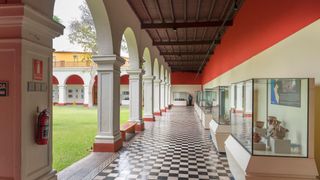
(Image credit: Alamy)
The largest of Peru’s museums, the Museo Nacional de Arqueología is a must-see for those wanting a deep understanding of Peruvian history and heritage. Created in 1822, the museum houses some 17,000 specimens from Peru’s rich tapestry of indigenous history and colonial influence. With all manner of items from ceramics to Incan textiles and pre-Hispanic organic material, the Museo Nacional de Arqueología is an important pillar of the capital city’s tourism and reflects the growing desire of many for its own objects to be reclaimed back to their native country.
Guggenheim Museum Bilbao, Bilbao, Spain

(Image credit: Alamy)
Known as much for its stunning, Frank Gehry-designed architecture as for its contemporary art collection, the Guggenheim Bilbao is a must-visit for architecture and art lovers alike. Part of a wider collection of museums across the world, the Guggenheim Bilbao is home to works of art and sculpture by the likes of Jeff Koons, Mark Rothko and Jean-Michel Basquiat. The museum is also at the forefront of environmental and sustainability efforts, setting out goals and frameworks to ensure it not only gives back to people but also the planet.
The Australian War Memorial, Canberra, Australia
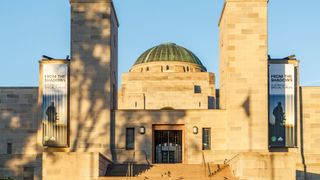
(Image credit: Alamy)
The Australian War Memorial Museum pays tribute to the Australians who have served in war. It works as a shrine, a museum and an archive, all to preserve and commemorate the sacrifice of Australian service people abroad and during times of domestic conflict. Its extensive catalogue of data and objects allows both visitors and locals alike to find events, military units and even specific people who were involved in war efforts, making it a moving but incredibly interesting museum to visit.
The Museum of Egyptian Antiquities, Cairo, Egypt
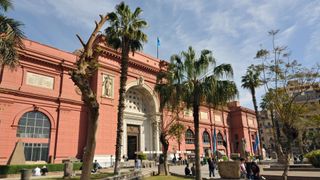
(Image credit: Alamy)
Also known colloquially as the Egyptian Museum, The Museum of Egyptian Antiquities is home to the world’s most extensive collection of Pharaonic antiquities, including the treasures of Tutankhamun. With over 100,000 artefacts capturing the fascinating history of Egypt and its people it is no wonder that over 100,000,000 people have visited the site since it opened in 1902. Inside the museum, you will be met with complete burials of Egyptian nobility Yuya and Thuya as well as countless statues in honour of Egyptian kings like Menkaure and Amenhotep III. The museum is also continually working to restore the museum to its original glory and help grow Egypt’s national economy.
National Gallery of Art, Washington, D.C, USA
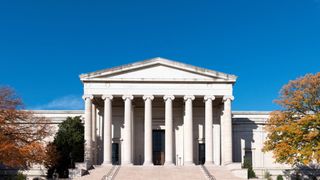
(Image credit: Alamy)
A gift to the people of the United States by ex-secretary of the treasury and art collector Andrew W. Mellon during the presidency of Franklin D. Roosevelt, the National Gallery of Art in Washington D.C boasts a comprehensive collection of Western art, including major works by Raphael, Van Gogh and American painter and printmaker Mary Cassatt. All housed in a stunning neoclassical building, the National Gallery of Art has been curating its collections since its opening to the public in 1941 and now houses more than 150,000 works.
Prado Museum, Madrid, Spain
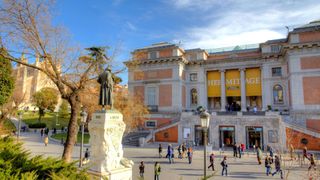
(Image credit: Alamy)
Located in Spain’s capital city, The Prado Museum is renowned for its extensive collection of European art, particularly Spanish masterpieces by Goya, Velázquez, and Titian. The majority of the Prado Museum’s work consists of years of collections from Spain’s 16th and 17th-century monarchs, who curated their pieces based on their tastes. Alongside these, expect to see extensive collections of ancient frescoes and religious icons that date back as early as the 12th century.
The National Museum of Korea, Seoul, South Korea
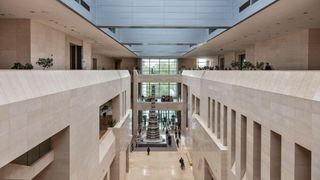
(Image credit: Alamy)
Located in the Yongsan District of Seoul, The National Museum of Korea offers a comprehensive overview of Korean history, art, and culture, from prehistoric times to the present, with thousands of artefacts on display. Established in 1945, following World War Two, this national museum has been dedicated to collecting and displaying the rich history of South Korea. You can expect to see prehistoric and ancient Korean artefacts all the way through to examples of calligraphy and painting under different rulers.
National WWII Museum, New Orleans, USA
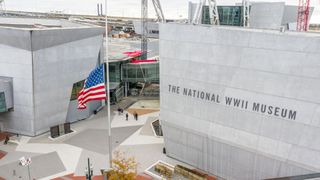
(Image credit: Alamy)
The National WWII Museum in New Orleans provides a comprehensive account of the American experience in World War II, featuring immersive exhibits, personal narratives and military artefacts. Covering the role the US played in the War is at the forefront of this museum, but also looks at and covers the wider context of different countries and people including the United Kingdom and Anne Frank. With full size military vehicles, military uniforms, extensive numbers of photographs and a collection of medals from various branches of the US armed forces, visitors will leave the museum truly immersed in the experience of WWII.

